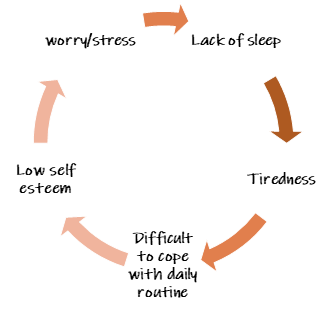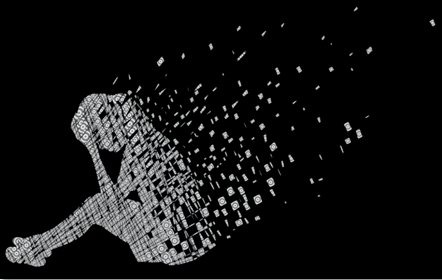
We frequently hear individuals saying “Seems as though, you woke up on some unacceptable side of the bed.”
To be straightforward there is a touch of truth in this casual saying. It’s an obvious fact that sleep has a fundamental or to be exact a crucial play in deciding one’s physical and mental prosperity.
Helpless sleep can contrarily affect your wellbeing. It can leave you feeling touchy, drained, and depleted temporarily,
but the prolonged disturbance of your sleep cycle can turn tables promoting long-term problems and outcomes including heart disease, type-2 diabetes, depression, insomnia, anxiety, or bipolar disorders.

The complexity among sleep and mental health has been for some time known and is impacted by a huge number of elements you might perceive some from below:
INSOMNIA – Finding it difficult to fall asleep or get up sooner than you needed to.
DISTURBANCES – Nightmares, panic attacks, flashbacks, or psychosis during sleep.
WAKING UP – thinking that it is difficult to awaken or get up
EXTREME EXHAUSTION – frequently feeling excessively tired or depleted during the day.
PROLONGED SLEEP – sleeping for longer than expected or feeling continually sleepy.
If you witness sleeping problems you might,
Feel restless, discouraged, or self-destructive
Experience Psychotic episodes which can trigger madness, psychosis, or neurosis
Feel lonely or isolated
struggle to concentrate
Neglect to plan and simply decide
Feel bad-tempered and miss the mark on the drive to get things done
Struggle to keep an agreeable relationship with loved ones
Continually feel negative, discouraged, lazy, and disapprove of your day-to-day life.
Often prone to health problems.

WHAT CAUSES PROBLEMS WITH SLEEP?
The absence of sleep might trigger the beginning of specific psychological conditions, despite the fact that specialists are not totally sure of the fundamental explanations behind this. Because of this circular relationship between your sleep patterns and your mental state, it is important to talk to your doctor if you are having problems falling or staying asleep.
What might be your goal to sleeplessness… Consider and analyze the following possibilities:
STRESS/WORRIES – Financial, Personal, Emotional, Physical, or Mental concerns.
PLACE YOU SLEEP – an awkward bed, cushions, sleeping position, or ambiance
Sleep DISORDERS – in relation to health and heredity
MEDICATIONS
RECREATIONAL DRUGS/ALCOHOL
IRREGULAR SLEEP CYCLE – Due to the profession.
Injury – Coping up with a current or past injury.

TIPS TO IMPROVE YOUR SLEEP
A typical reason for sleeping issues is poor sleep hygiene. Stepping up sleep hygiene by cultivating habits and a bedroom set that is conducive to sleep can go a long way in reducing sleep disruptions.
In addition to seeking help from medical professionals, there are sure advances that you can give a shot all alone to work on your sleep and prosperity. Having a decent sleep cycle, hygiene, or practices that support sleep, are critical to staying rested and avoiding sleep and exhaustion during the day.
-Invest in a good quality mattress, pillows, and/or bedding accessories such as orthopedic memory foam to relieve physical stress and discomfort.
-Cut down your coffee intake especially close to sleep time
-Set a consistent sleeping plan
-Try out relaxation techniques like yoga, meditation, or physical exercise
-Avoid alcohol, tobacco, or sleep-disrupting medications or drugs
-Put away electronic gadgets.
-Enjoy some time off from unpleasant exercises; go on a speedy excursion or a spa date.
-Include therapeutic/sleep-inducing ingredients like chamomile, almonds, bananas, oats, or warm milk in your eating regimen.
-Pay attention to restorative/quiet music, read great books
-Block excess light/sound that could disrupt sleep.

talk to a healthcare professional if you suspect that your sleep problems might be caused by or contributing to a mental health condition. Depression, anxiety, and other psychiatric disorders can interfere with sleep, but addressing your sleep problems may also have a positive impact on your psychological symptoms.
Nap tip: Drink chamomile-implanted tea every night before bed to calm your senses internally.
Attempt our sleep-inducing orthopedic memory foam mattresses, pillows, and accessories to quickly fall and have a prolonged undisrupted sleep. Relax, Revive and Re-energise and give a new beginning to your mornings with our superior range of bedding solutions.


One Comment